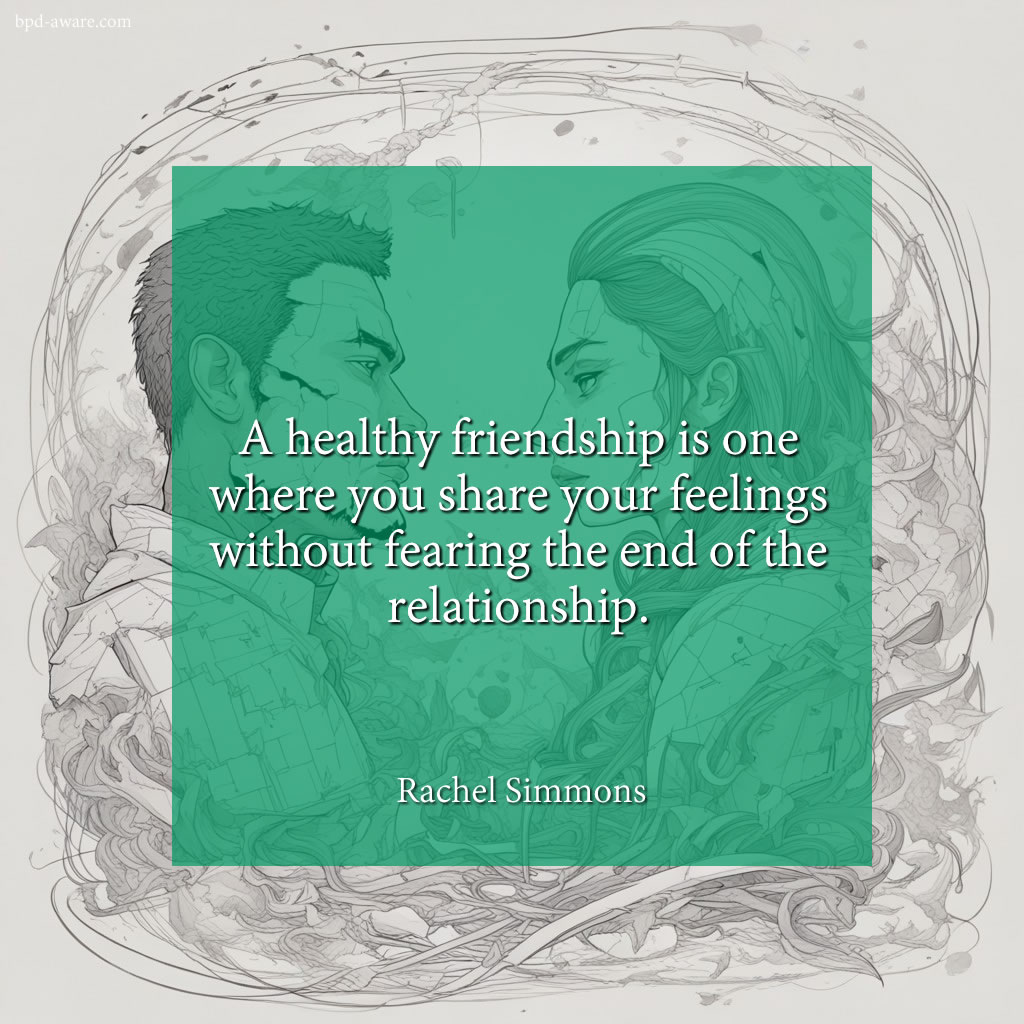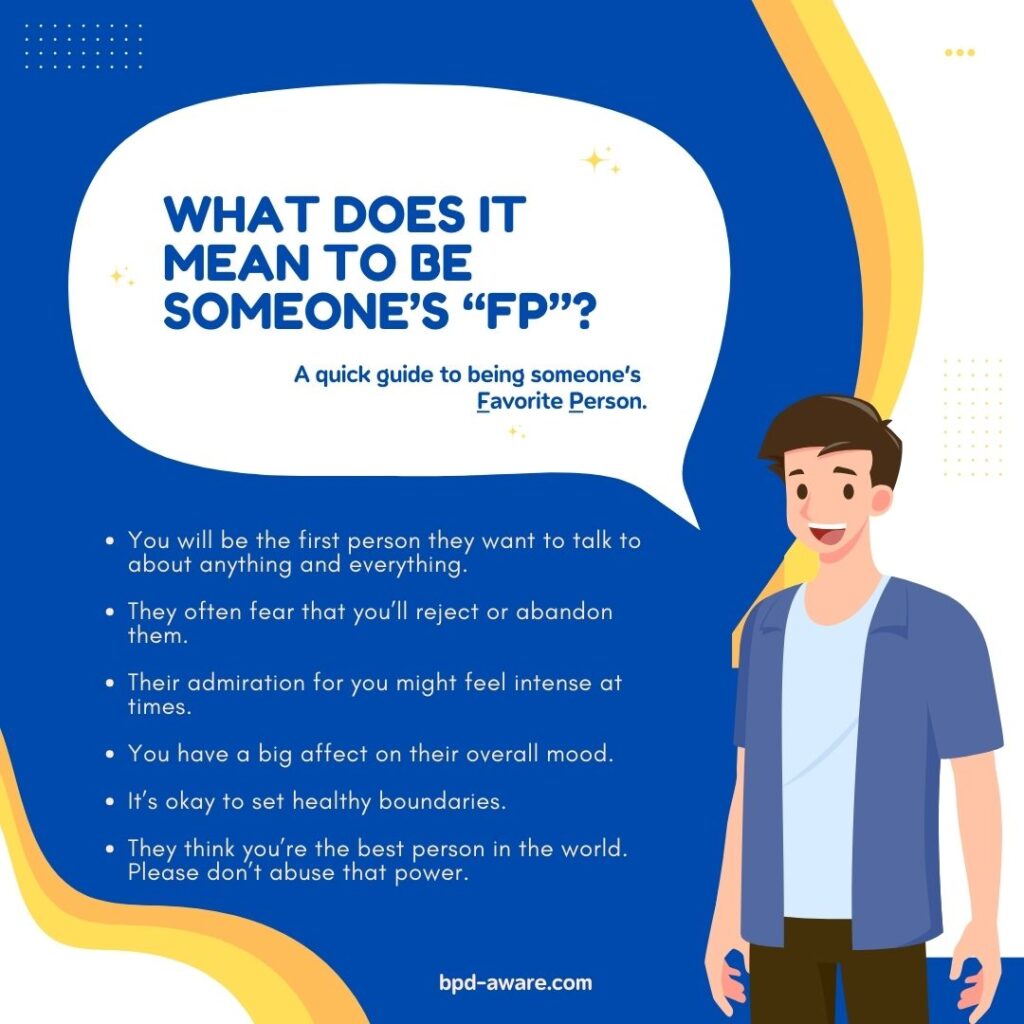Whether you have Borderline Personality Disorder (BPD), know someone with it, or are just studying BPD for your own education, you may have come across the term “FP” in your travels and aren’t sure what it means.
FP simply stands for Favorite Person. For someone with BPD, a Favorite Person is a person that they simply can’t live without and is the most important person in their life. FPs can be family members, friends, partners, teachers, work colleagues, or anyone the person with borderline personality disorder feels close to.
While it’s true that most people have one or two people they feel closest to, an FP goes far beyond that. Someone with BPD will idolize and obsess over their FP. As you can imagine, this can be a very intense and unhealthy relationship.
Why Does Someone With BPD Develop a Favorite Person?
One of the defining characteristics of borderline personality disorder is a fear of being abandoned. When you couple this with the other common BPD symptoms of black-and-white thinking and feelings of emptiness, it perhaps becomes easier to understand the Favorite Person phenomenon.
Someone with BPD will think that their Favorite Person is perfect and can do no wrong. Therefore they need this person in their life at all times. When they’re around their FP, they don’t feel empty like they do otherwise. They will look to their FP for validation and seek it regularly. If they don’t find this validation or don’t find it quickly enough, it can cause the person with borderline personality to split and feel completely worthless.
Not only can this relationship be incredibly unhealthy for both parties, but it’s also open to abusive behavior from both parties. People with borderline personality disorder often attract people with narcissistic personality disorder. Narcissists love to be the center of attention and they get exactly what they crave from people with BPD. The major problem with this is that narcissists can become very cold and distant if they don’t get exactly what they want. It’s important to remember, however, that narcissism is a personality disorder in its own right and a narcissist deserves empathy just as a person with borderline personality disorder does.
It should also be noted that not all people who become a Favorite Person to someone with borderline personality disorder are narcissists. Most are just regular people with their own good points and bad points.

What to Expect if You Have a FP and How to Cope
When you have a Favorite Person it can feel like one of the greatest feelings in the world. You’ve finally found someone who’s always lovely, kind, and all-around perfect! Except that, of course, no one in reality is perfect or lovely and kind all of the time. Even the best people have bad moments and it’s unrealistic to expect otherwise.
You’re going to feel extremely attached to your Favorite Person like they’re the other half of you – or the you that you’d like to be. You’ll want to spend a lot of time with them and your interactions with them will shape your moods. When you don’t get to spend much time with them, for whatever reason, your fear of abandonment can flare up. You’re also likely to feel extremely jealous of anyone else who gets to spend time with your Favorite Person when you’re not around.
You’ll feel dependent on your FP for support and reassurance. Your feelings for your Favorite Person could become so strong that you neglect other relationships, interests, and hobbies.
A negative interaction with your FP could trigger some of the worst symptoms of your BPD. For example, an argument with your Favorite Person could cause you to think about or commit self-harm.
As mentioned previously, the relationship between someone with BPD and their FP is not a healthy one. It’s important to recognize this. If you’ve been diagnosed with borderline personality disorder or strongly suspect you have it, be open with your FP about this so they can help you and your situation. By sharing your knowledge and allowing them to do their own research, it can make your relationship much stronger and healthier.
We always recommend treatment and therapy for BPD, if your circumstances allow it. Not only can it help you cope with the highs and lows of having an FP, but a recovery is possible.
If, for whatever reason, you can’t access treatment, there are a few other things that can help.
Schedule yourself an hour or two each day to practice a healthy hobby or follow an interest. Turn your phone off and focus on yourself and the task at hand. Time can fly when you’re doing something you enjoy and it’ll give you and your FP a healthy little break from one another.
Try to save all your news for one window of interaction. As much as I know you want to tell your FP about every little thing that happened to you, this can be very draining for them. Instead of texting every thought you have, try writing them down and then calling your FP later for a short chat. If you can both agree on a scheduled call time (say once a day at a certain time for fifteen minutes) it creates a healthy boundary for both of you.
Don’t neglect other friendships and relationships to focus all your energies on one person. Do your best to build a network of people you feel you can trust and rely on. It doesn’t have to be huge but if you can have three solid relationships that you maintain, it’s a lot healthier than one.
It’s also important to remember that your FP is not a therapist (unless they are, if so, you can ignore the next bit). I believe that most people are good most of the time when they have the opportunity to be so. Hopefully, that’s true of your Favorite Person and they want to help you. However, just because they want to help you, it doesn’t mean they have the ability or capacity to do so. Please bear that in mind.

What to Expect if You’re an FP and How to Cope
If you don’t have borderline personality disorder it can be challenging to put yourself in that mind frame and the idea of having or being a Favorite Person might seem strange or off-putting. It can indeed be very intense and draining to have someone be so reliant on you.
Here are a few things to expect or look out for:
You’ll be the first person they want to talk about whenever anything happens to them. Whether it’s something big like a row with a parent or something small like finishing a book they’ve really enjoyed, you’re going to be the first one to hear about it.
You can feel their admiration, to an above-normal degree. When you’re an FP, you can do no wrong in their eyes. Even if you talk with them about a situation where you were clearly in the wrong, they will defend you. This can, for obvious reasons, be intoxicating, but it’s not healthy for either of you.
You have a big effect on their mood. If you don’t respond to a text message quickly enough then it can feel like a major rejection for someone with BPD, especially when you’re their FP. Or if you have a fun day out together you might sense that they’re incredibly happy, like they’re floating on a cloud.
They’ll cling to you whenever possible. If you’re someone’s FP, that person will think you’re the best person in the world. They’ll want to spend as much time with you as possible and be in communication whenever they’re not. Expect a lot of text messages and invitations to spend time together.
As you might be starting to gather, being an FP can be difficult to cope with. Sometimes you just don’t have the energy to help someone else regulate their emotions all the time. You have your own wants and needs that are perfectly valid. That’s why it’s important to set healthy boundaries in your relationship and stick to them.
For example, there might be times during the day when you can’t talk – such as when you’re at work or participating in an event. Communicate this and be clear that you won’t be available during those hours.
Maintain other relationships and commitments. You have your relationships, interests, and hobbies. It’s unfair for anyone to expect you to focus your life around them.
Don’t make promises or offer false hope. Don’t promise someone with BPD that you will see them when you know that you’re likely to back out at the last minute. This will be crushing to them and stoke their fear of abandonment. It’s perfectly okay to say that you’re busy or unavailable for a while.
When you set a boundary, it’s important to follow through with it. If you ask not to be disturbed during your work hours and you’re being bombarded by phone calls, tell them calmly but firmly that they’ve violated your trust and it won’t be tolerated.
I always recommend that whenever you know someone with borderline personality disorder you strongly suggest they enter therapy, if they’re not already in therapy. Without therapy, it’s highly unlikely they will ever recover from their disorder and they will continue to exhibit unhealthy patterns of behavior. If you’re a Favorite Person, you’re in a position of power where you can help make someone’s life better.
Final Thoughts
A relationship between someone with BPD and their Favorite Person is inherently unbalanced and unhealthy. However, it can be made much more healthy with honesty, open communication, and boundaries that are adhered to. Whenever possible, professional help should be sought.
Sources, Resources, and Further Reading
- Understanding the BPD Favorite Person Relationship: https://www.verywellmind.com/who-is-a-favorite-person-to-someone-with-bpd-5203892
- Understanding The “Favorite Person” Relationship in BPD: https://www.talkspace.com/mental-health/conditions/articles/bpd-favorite-person/
- What You Need To Know About BPD and Their ‘Favorite Person’: https://medium.com/invisible-illness/what-you-need-to-know-about-bpd-and-their-favorite-person-b21ec201d5d8
- What is a Favourite Person in BPD?: https://www.centreofexcellence.com/favourite-person-in-bpd/
















